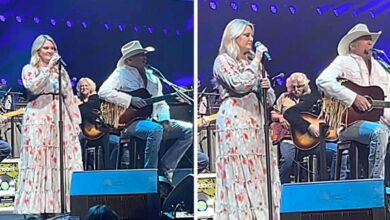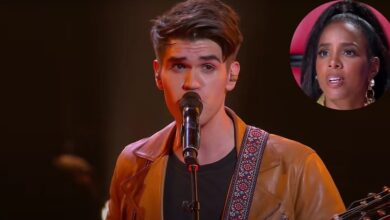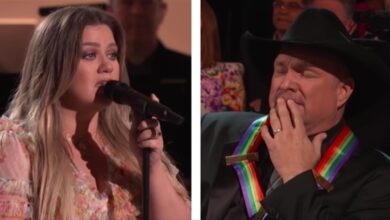The “I Will Always Love You” Duet By Dolly Parton And Vince Gill Left Us Mesmerized And Completely Chilled
Dolly Parton and Vince Gill’s duet of “I Will Always Love You” stands as an exceptional example of artistry that transcends time. Their collaboration breathes new life into a song that has already become a hallmark of emotional expression in the music industry. This performance not only showcases the capable vocal prowess of both artists but also celebrates their ability to tap into the song’s deeply personal and universal themes, making it a rich, emotive experience for listeners.
Parton originally penned “I Will Always Love You” in the early 1970s, a time when her career was just gaining momentum. The song was written as a love letter, reflecting a bittersweet farewell to her former mentor and business partner, Porter Wagoner. This personal origin story gives the song added depth, establishing it as a testament to the many forms of love and separation we all experience in life. Over the decades, the song has found various interpretations and has been adopted by numerous artists across diverse musical genres, signaling its universal resonance.
The pivotal moment for “I Will Always Love You” came when Whitney Houston covered the song for *The Bodyguard* soundtrack in 1992. Houston’s breathtaking rendition catapulted the song into global consciousness, leading to its status as one of the best-selling singles of all time. However, it is essential to recognize that Dolly Parton’s original version was a carefully crafted expression of love and loss, reflecting a more understated and deeply personal connection. The 1995 duet with Vince Gill brings the song back to its country roots, while infusing it with a fresh dynamic that highlights both artists’ unique styles.
As the duet begins, Dolly Parton gracefully leads with her signature voice, known for its warmth and sincerity. Her vocal delivery is imbued with an emotional weight that is instantly captivating. When Vince Gill enters the performance, his smooth tenor complements Dolly’s distinctive tones beautifully. The natural chemistry between the two musicians is palpable; each note they sing feels intentional, as though they are sharing not just a song but also an experience. Their harmonies create an ethereal quality that elevates the song, allowing it to resonate with listeners on a new level.
One of the defining aspects of their rendition lies in its minimalistic instrumentation. The gentle guitar strumming and soft piano underscore the emotional lyrics without overshadowing the vocal performances. This choice in arrangement allows the listener to focus on the raw feelings expressed through their voices. The simplicity of the backdrop offers an intimate listening experience that feels personal, almost like eavesdropping on a private moment of shared emotion.
Dolly Parton’s background as an artist speaks volumes about her heritage and the themes she often explores in her music. Born in a poor family in Tennessee, she was the fourth of twelve children and grew up with a deep appreciation for storytelling and music. She emerged as a trailblazer in country music, determined to carve out her own identity in a predominantly male-driven industry. Parton’s ability to connect with her audience through personal narratives about love, loss, and aspiration underpins her prolific career and the timeless nature of her songwriting.
Vince Gill adds another layer to the duet with his rich musical background. Growing up in Oklahoma, Gill showed an early talent for music, influenced by the folk and country traditions of his upbringing. His career has been marked by a series of impressive accomplishments, including numerous Grammy Awards and memberships in the Grand Ole Opry. Gill has also made a name for himself as a passionate collaborator, often working with other artists to create music that resonates on both a commercial and emotional level. His intricate guitar playing and smooth vocal harmonies enrich this duet, making it an unforgettable experience.
The magic of Parton and Gill’s collaboration lies in their ability to interpret the song in a way that feels both authentic and new. Their interpretations tap into the emotional core of “I Will Always Love You,” allowing it to speak to a new generation of listeners while retaining its original poignancy. Through their performances over the years, both artists have remained relevant, proving that their art is dynamic and capable of adaptation without losing its essence.
In reflecting on the cultural impact of “I Will Always Love You,” it is clear that the song has woven itself into the fabric of music history. Parton’s song has become a cultural touchstone, often evoking deep feelings of nostalgia and sentimentality. The combination of both artists’ voices reinforces the song’s themes of love that endures beyond physical separation, making it a fitting anthem for myriad life experiences, including relationships, friendships, and professional partnerships that require difficult goodbyes.
Dolly Parton and Vince Gill’s duet encapsulates the very essence of what makes a song timeless. It not only revives a classic but also allows for a fresh consideration of its meanings. Their harmonious blend and emotional connection create something special that resonates with both longtime fans and newcomers alike. As they join in song, they remind us that love remains a profound and connected experience, one that can bridge time and space—even through the simplest of melodies. Their performance, rich in emotional landscapes, ensures that “I Will Always Love You” continues to echo in the hearts of many for generations to come.





